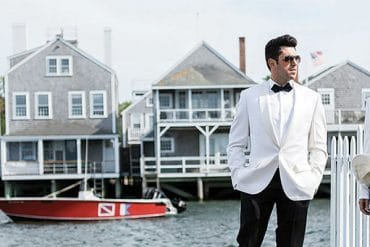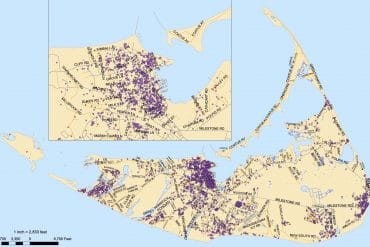Sebastian Junger explains how the camaraderie of the battlefield contrasts with the lack of community at home.
Sebastian Junger is a very different writer than when he first came to Nantucket in 1998 with his overnight bestseller The Perfect Storm. After more than twenty years covering some of the most intense combat in the world, the author now often finds himself in the safety of his summer home on Cape Cod, grappling with the lessons he’s taken away from war zones. “Once I stopped war reporting, I was able to think with a little more nuance and some more quietness,” Junger told me in his home library in Truro. “Out of that came these thoughts that I had about my society.” Indeed, Junger’s latest book, Tribe, traces the roots of post traumatic stress disorder (PTSD) beyond the battlefield and into communities like ours on Nantucket.
 “Tribe is the last I’ll write about war, journalistically,” Junger said. “I’m not going back anymore… This is probably the end of it.” Released just before Memorial Day, Tribe caps a catalogue of work that began in 2007, when Junger and his colleague, Tim Hetherington, spent fifteen months embedded in an American platoon outpost in Afghanistan’s Korengal Valley, then considered the most violent region in the war. Despite enduring the rigors of combat, having even been rocked by an IED while riding in a Humvee, Junger found a fulfilling sense of community living among the soldiers. “When I was out in the Korengal Valley with those guys, it was very hard to come back [to civilian life],” he said. “It’s crazy, but for all the deprivation out there, personally it was incredibly nice.” The deployment became fodder for an Oscar-nominated documentary and a New York Times bestseller titled WAR. Then Junger’s world was turned upside down.
“Tribe is the last I’ll write about war, journalistically,” Junger said. “I’m not going back anymore… This is probably the end of it.” Released just before Memorial Day, Tribe caps a catalogue of work that began in 2007, when Junger and his colleague, Tim Hetherington, spent fifteen months embedded in an American platoon outpost in Afghanistan’s Korengal Valley, then considered the most violent region in the war. Despite enduring the rigors of combat, having even been rocked by an IED while riding in a Humvee, Junger found a fulfilling sense of community living among the soldiers. “When I was out in the Korengal Valley with those guys, it was very hard to come back [to civilian life],” he said. “It’s crazy, but for all the deprivation out there, personally it was incredibly nice.” The deployment became fodder for an Oscar-nominated documentary and a New York Times bestseller titled WAR. Then Junger’s world was turned upside down.
In April of 2011, Tim Hetherington was killed in Misrata, Libya, prompting Junger to retire from combat reporting. “Had Tim died earlier in my life, earlier in my career, I think I would have not made that decision,” he said. “But by the time he died, I was married and I had answered a lot of questions I had about war and about myself.” Reintegrating into civilian life over the last five years has enabled the author to examine perhaps the most insidious con- sequence of modern American warfare: the astronomical rates of PTSD suffered by returning combat veterans.
Compounding the physical and emotional traumas of war, Junger points to the communities that soldiers return to in the United States as part of the problem. He believes that modern society is inherently fractured, and it’s this resulting alienation that leads to many of the psychological problems that ail most people, not only returning soldiers. “Our towns are constructed in as isolating a way as possible,” he says. “Families live in real isolation from one another. It’s hard to break that down until a tornado comes, and suddenly everyone is acting tribally, and people have this weird nostalgia for that.”
Junger’s hypothesis circles around this idea of tribal living, specifically how the emotional burdens society faces today were absent in the egalitarian communities of American Indian tribes. “Suicide, depression, PTSD — basically none of those things existed in tribal society,” he explained. Society affords rare opportunities to experience tribal living; a soldier in combat is the closest re-creation we have today. “They have this close intense situation in a hostile environment. It’s supercharged with adrenaline and intimacy and inter-reliance — that’s exactly tribal life,” Junger said. “And they don’t want to go back to the great American suburb.” When soldiers return, not only are they burdened by the traumas of war, but they’re reintegrating into a community that’s far removed from the relationships they relied on while on the battlefield.
This is what Junger hopes to discuss with audiences at the Nantucket Book Festival. “I want audiences to think about their lives in real human terms,” he said. “Do I feel close to people? Who would I give my life for? Obviously your wife and kids. But anyone else? Would you risk your life for your community? No? Then, well, you don’t really live in a community. If you are not willing to risk your life, then it’s not really a community in the very ancient sense of the word. You’re living in a modern version of the community in which people care more about themselves than the collective.”
Sebastian Junger will be interviewed by N Magazine editor and author of this article Robert Cocuzzo at The Nantucket Book Festival for “Homeland Insecurity” on Friday, June 17th at 4:30 P.M. at the Atheneum Great Hall.






